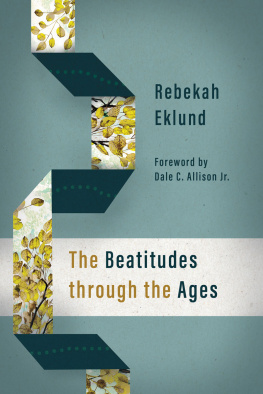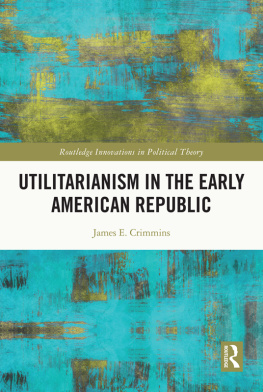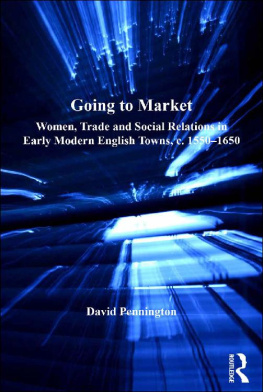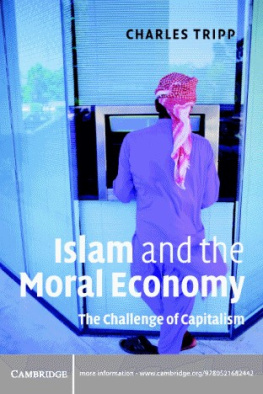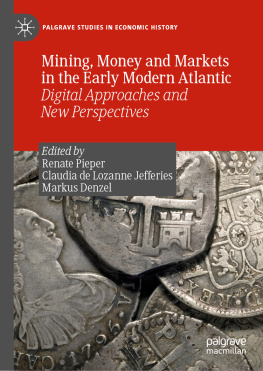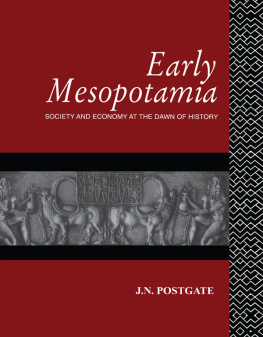Eklund - Literature and moral economy in the early modern Atlantic: elegant sufficiencies
Here you can read online Eklund - Literature and moral economy in the early modern Atlantic: elegant sufficiencies full text of the book (entire story) in english for free. Download pdf and epub, get meaning, cover and reviews about this ebook. City: Burlington;Farnham, year: 2015, publisher: Taylor & Francis Group;Ashgate, genre: Romance novel. Description of the work, (preface) as well as reviews are available. Best literature library LitArk.com created for fans of good reading and offers a wide selection of genres:
Romance novel
Science fiction
Adventure
Detective
Science
History
Home and family
Prose
Art
Politics
Computer
Non-fiction
Religion
Business
Children
Humor
Choose a favorite category and find really read worthwhile books. Enjoy immersion in the world of imagination, feel the emotions of the characters or learn something new for yourself, make an fascinating discovery.

- Book:Literature and moral economy in the early modern Atlantic: elegant sufficiencies
- Author:
- Publisher:Taylor & Francis Group;Ashgate
- Genre:
- Year:2015
- City:Burlington;Farnham
- Rating:5 / 5
- Favourites:Add to favourites
- Your mark:
- 100
- 1
- 2
- 3
- 4
- 5
Literature and moral economy in the early modern Atlantic: elegant sufficiencies: summary, description and annotation
We offer to read an annotation, description, summary or preface (depends on what the author of the book "Literature and moral economy in the early modern Atlantic: elegant sufficiencies" wrote himself). If you haven't found the necessary information about the book — write in the comments, we will try to find it.
Eklund: author's other books
Who wrote Literature and moral economy in the early modern Atlantic: elegant sufficiencies? Find out the surname, the name of the author of the book and a list of all author's works by series.
Literature and moral economy in the early modern Atlantic: elegant sufficiencies — read online for free the complete book (whole text) full work
Below is the text of the book, divided by pages. System saving the place of the last page read, allows you to conveniently read the book "Literature and moral economy in the early modern Atlantic: elegant sufficiencies" online for free, without having to search again every time where you left off. Put a bookmark, and you can go to the page where you finished reading at any time.
Font size:
Interval:
Bookmark:
LITERATURE AND MORAL ECONOMY IN THE EARLY MODERN ATLANTIC
for Pat Pratt
Elegant Sufficiencies
HILLARY EKLUND
Loyola University-New Orleans, USA

First published 2015 by Ashgate Publishing
Published 2016 by Routledge
2 Park Square, Milton Park, Abingdon, Oxon OX14 4RN
711 Third Avenue, New York, NY 10017, USA
Routledge is an imprint of the Taylor & Francis Group, an informa business
Copyright Hillary Eklund 2015
Hillary Eklund has asserted her right under the Copyright, Designs and Patents Act, 1988, to be identified as the author of this work.
All rights reserved. No part of this book may be reprinted or reproduced or utilised in any form or by any electronic, mechanical, or other means, now known or hereafter invented, including photocopying and recording, or in any information storage or retrieval system, without permission in writing from the publishers.
Notice:
Product or corporate names may be trademarks or registered trademarks, and are used only for identification and explanation without intent to infringe.
British Library Cataloguing in Publication Data
A catalogue record for this book is available from the British Library
The Library of Congress has cataloged the printed edition as follows:
Eklund, Hillary Caroline, 1977
Literature and moral economy in the early modern Atlantic : elegant sufficiencies / by
Hillary Eklund.
pages cm
Includes bibliographical references and index.
ISBN 978-1-4094-6234-7 (hardcover: alk. paper) ISBN 978-1-3155-9263-3 (ebook) ISBN 978-1-3171-0443-8 (epub)
1. English literatureEarly modern, 15001700History and criticism. 2. Literature and societyEnglandHistory17th century. 3. Literature and societyEnglandHistory16th century. 4. American literatureColonial period, ca. 16001775History and criticism. I. Title.
PR431.E38 2015
820.93581dc23
2014040733
ISBN: 9781409462347 (hbk)
ISBN: 9781315592633 (ebk-PDF)
ISBN: 9781317104438 (ebk-ePUB)
.
.
.
.
.
No person is sufficient to the task of completing a book independently. To those who prepared me for and supported me in this work, and to those who responded to it along the way, I owe a debt of abundant gratitude.
My dissertation committee at Duke University shaped this project in its earliest phases and continue to provide excellent advice: I thank Maureen Quilligan, Laurie Shannon, Srinivas Aravamudan, and Priscilla Wald for their brilliant guidance and moral encouragement. Thanks also to Matt Cohen, Meg Greer, Ranji Khanna, Walter Mignolo, Rob Mitchell, Kathy Psomiades, Tom Robisheaux, Marc Schachter, and Irene Silverblatt for their excellent teaching and mentoring. To my intrepid writing comrades, Andrew Burkett, Sarah Lincoln, John Miles, and Cord Whitaker: your voices continue to make me stronger. A generous grant from the Folger Shakespeare Institute allowed me to follow my earliest instincts about this project in a seminar directed by Kim Hall in the fall of 2004. I am grateful to Kim and to my colleagues in that seminar for providing an intellectual environment for my ideas to germinate.
My colleagues and students at Loyola University New Orleans have supported and improved this book in countless ways. Special thanks to Kate Adams, Sarah Allison, John Biguenet, Sara Butler, Maria Calzada, Ted Cotton, Jo Ann Moran Cruz, Barbara Ewell, Katherine Fidler, Judith Gruber, Nathan Henne, Melanie McKay, Laura Murphy, Connie Rodriguez, Artemis Preeshl, Christopher Schaberg, Janelle Schwartz, John Sebastian, Chris Washington, and Tim Welsh. To the many students who helped me see texts afresh, test hypotheses, and refine arguments, I extend my sincerest gratitude. Thanks especially to Caroline Fisse for her excellent work as RA and her unassailably good humor.
One of the greatest joys I have experienced as a scholar of early modern literature has been discovering an expansive world of brilliant and generous colleagues in the field. For their thoughtful responses to earlier formulations of these arguments, I thank Robert Appelbaum, Amanda Bailey, Lynne Bruckner, Jim Casey, Stephanie Chamberlain, Kimberly Coles, Daniel Ellis, Valerie Forman, Ed Geisweidt, Eric Griffin, Jill Ingram, Bernhard Klein, Rebecca Laroche, Steve Mentz, Jemima Matthews, Katharine Maus, Jennifer Munroe, Vin Nardizzi, Jeff Rufo, Gitanjali Shahani, Valerie Traub, and Timothy Zajac. For inviting me to present on Renaissance literature and the problem of enough at Trinity University in San Antonio, I thank Nicole Marafioti. I am grateful to Erika Gaffney and Seth F. Hibbert at Ashgate, who made everything easy that could be, and to Kirsten Janene-Nelson, Susan Clements, and Lee Domingue for their editorial expertise. Any remaining errors are my own. Portions of were published in Shakespeare Studies, volume 42 (2014).
My final thanks go to my family, whose unshakable confidence is my greatest fortune. My parents, Bill and Elizabeth Eklund, are the ringleaders of an unrivaled community of love and support of whose beneficiaries I count myself just one among many. My husband, Greg Larsen, has shown a depth of kindness, patience, and love that surprises me with every new adventure.
As good ynough as a feast.
This for a truth say most and least.
But what ynough is iustly ment,
And with inough to be content,
Those are twoo pointes that fewe or none,
Can learne to know, and stande vpon.
John Heywood (1562)
It will be very difficult to define sufficiency and build the concept into economic theory and practice. But I think it will prove far more difficult to continue to operate on the principle that there is no such thing as enough.
Herman Daly (1993)
In sixteenth-century England material scarcity was a fact of life. What historians and climatologists call the Little Ice Age caused harvest failures and led to a five-fold increase in the price of wheat. Meanwhile, the growth of the English population and the conversion of farmland into pasture for livestock put tremendous pressure on limited resources. Against this backdrop of unpredictable cycles of plenty and scarcity, English poets and playwrights frequently quoted the proverb Enough is as good as a feast. The aphorism first appears in print as part of John Heywoods catalogue of Proverbs (1546). Literary uses like William Wagers interlude titled Inough Is As Good As a Feast (c. 1570) and George Gascoignes poem dedicated to an exploration of the theme (in The Poesies, 1575) confirm the proverbs appeal in late-Tudor contexts. But the ongoing discovery of the New World and the inexhaustible resources it was imagined to contain put new pressures on the question of what it meant to have enough.
At the heart of this book is a resistance to the cultural force of the commonplace enough is enough. The following chapters show how the idea of enough is not self-defining; it is instead formulated through the intersection of cultural and material forces. More specifically, Literature and Moral Economy in the Early Modern Atlantic traces how, during the century or so following European incursion into the Americas, English writers improvised new models of sufficiency in response to the growth of the English economy. Focusing on literature and moral economythe intersection of cultural attitudes and material practicesI describe how standards of economic sufficiency moved from strict regulations against excess toward the increasing pursuit of plenty through plunder, trade, and plantation. The very
Next pageFont size:
Interval:
Bookmark:
Similar books «Literature and moral economy in the early modern Atlantic: elegant sufficiencies»
Look at similar books to Literature and moral economy in the early modern Atlantic: elegant sufficiencies. We have selected literature similar in name and meaning in the hope of providing readers with more options to find new, interesting, not yet read works.
Discussion, reviews of the book Literature and moral economy in the early modern Atlantic: elegant sufficiencies and just readers' own opinions. Leave your comments, write what you think about the work, its meaning or the main characters. Specify what exactly you liked and what you didn't like, and why you think so.

